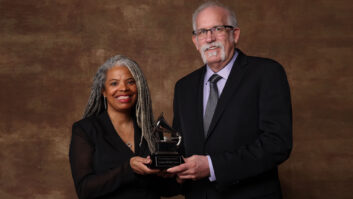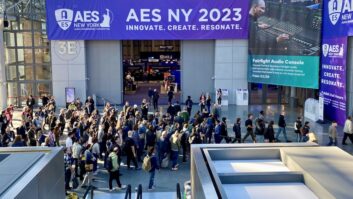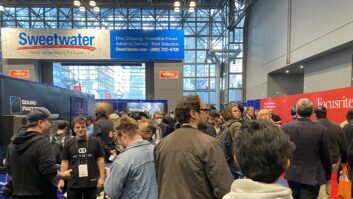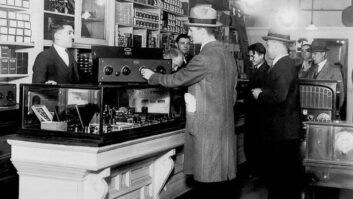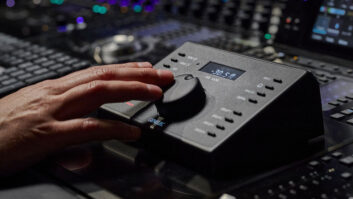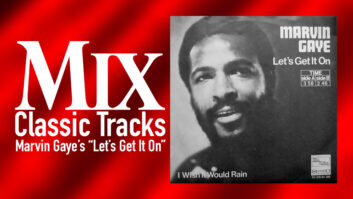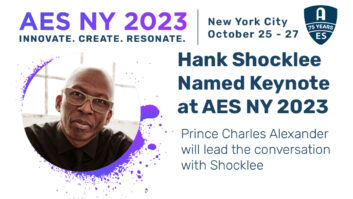NEW YORK CITY — At the Opening Ceremonies of the 123rd AES Convention in New York City, Soundcraft Technical Director and Co-founder Graham Blyth was presented with the prestigious Fellowship Award “in recognition of his distinguished career in mixing console design and service to the Society”, noted AES President Wieslaw Woszczyk, who officially conferred the award at the Jacob K. Javits Convention Center on Friday, October 5th.
“I was both surprised and delighted to be awarded an AES Fellowship, particularly because I’ve never presented any papers on my subject,” notes Blyth. “What I have learned and done in the 37 years I’ve been designing consoles has more to do with having green fingers and a very inquiring mind than any structured research process, so I was flattered for the recognition of my contributions. It was also an honor to share the stage with such luminaries as Bob Ludwig, Phil Ramone and Neil Muncie, who have all truly had a profound impact on this industry that we love.”
According to the AES Opening Ceremonies brochure, the Fellowship Award is presented each year to a very select few Society members that have “rendered conspicuous service or [are] recognized to have made a valuable contribution to the advancement in or dissemination of knowledge of audio engineering or in the promotion of its application in practice.”
About Graham Blyth:
Born in 1948, Graham Blyth was raised and educated in Epsom, Surrey, UK. He took piano lessons from the age of four and later gained a junior scholarship to Trinity College of Music, London, where he also studied the organ. Blyth moved on to Bristol University in 1966 to study electrical engineering and there founded the Student Music Society, conducting Bach’s monumental St. Matthew’s Passion in his final year.
After graduation, Blyth worked in the R&D department of Compton Organs, where he met his mentor, the late Bill Kelsey, and learned how to lay out printed circuit boards. Sadly, the company was on its last legs and so he moved on to Graseby Instruments where he designed filters for Admiralty Underwater Weapons contracts, while in the evenings helping Kelsey put together a large mixing desk for Emerson, Lake and Palmer to use at the legendary 1970 Isle of Wight Festival. After this success, Kelsey and his business partner set up Kelsey & Morris. Blyth joined them in early 1971, assisting in the design and construction of mixers for many of the great bands of the time, including King Crimson, T.Rex, and Ten Years After.
Blyth left Kelsey’s within a couple of years with the intent to build his own mixer. With no idea how to sell it, a friend in the power amplifier business introduced him to Phil Dudderidge and Paul Dobson at Rotary Speaker Developments. Dudderidge and Blyth shortly thereafter paired up to form Soundcraft (known then as Soundcraft Electronics Limited), which was incorporated in 1973 and grew rapidly to become one of the major players in the mixing console market.
In the late ’80s, while still with Soundcraft, Blyth returned to his musical studies on both piano and organ, gaining performance diplomas from the Royal College of Organists, Royal College of Music, and Trinity College of Music, culminating in a piano recital at London’s Whitfield Street Studio to celebrate his 40th birthday and an organ recital at St. Thomas Church on Fifth Avenue in New York City to celebrate Soundcraft’s 21st year. These organ recitals are now a staple of the AES schedule, including Blyth’s most recent performance of Widor’s entire 5th Organ Symphony, plus works by Parry, Stanford, Matthias and other British composers, at Brick Presbyterian Church on NYC’s Upper East Side.
Following the sale of Soundcraft to Harman International in 1988, Blyth has continued in his position as technical director but has also become involved in the design of digital organs and is acknowledged to be the one of the leaders in this field. He currently resides in Wantage, Oxfordshire, where he serves as artistic director of Wantage Chamber Concerts and director of the Wantage Festival of Arts.
In 1996, he built an 80-seat recital hall attached to his house using the Lexicon Lares acoustics enhancement system developed by David Griesinger. The hall, a truly unique space in the UK, can nicely host anything from string quartet concerts to organ recitals and has been used for many classical recordings.
In addition to his recent AES Fellowship, Blyth was also elected as a Fellow of the Royal Society of Arts in 2006.
About Soundcraft:
Headquartered at the Harman International Industries complex in Potters Bar, England, Soundcraft has built its global reputation over more than 30 years as a preeminent manufacturer of professional mixing consoles serving live, broadcast, theatre, recording and DJ markets. Worldwide sales and marketing for the brand is handled by the Soundcraft Studer Group, also of Potters Bar. In the United States, Soundcraft and Studer’s products are distributed by Harman Pro North America, a subsidiary of Harman International Industries.
About the Harman Pro Group:
The Harman Pro Group (www.harmanpro.com) is the world’s largest provider of professional audio products and system solutions for commercial sound, contracting, tour sound, recording and broadcast, musician, portable PA and cinema applications. The Group is headquartered in Northridge, California and includes industry leaders AKG Acoustics, BSS Audio, Crown International, dbx, DigiTech, JBL Professional, Lexicon, Soundcraft, and Studer. The Group is part of Harman International Industries, Incorporated (NYSE: HAR), a leading supplier of high-quality, high fidelity audio products and infotainment systems for the automotive, home and professional markets.
# # #
Contact:
Soundcraft USA / Harman Pro North America
8500 Balboa Boulevard, Northridge, CA 91329
Tel: 818.920.3212 / Fax: 818.920.3208
Email: [email protected] / URL: www.soundcraft.com
